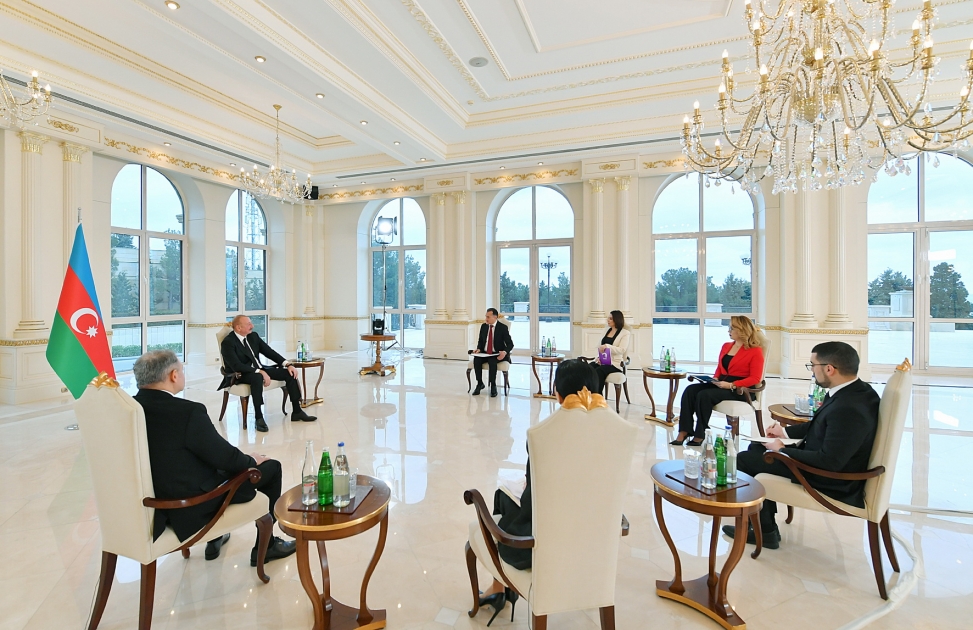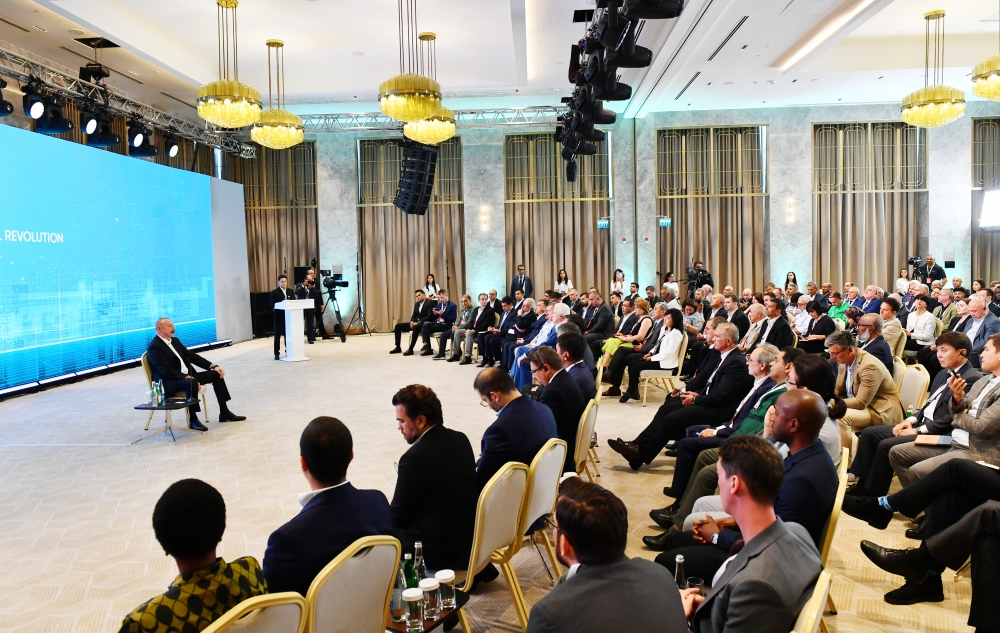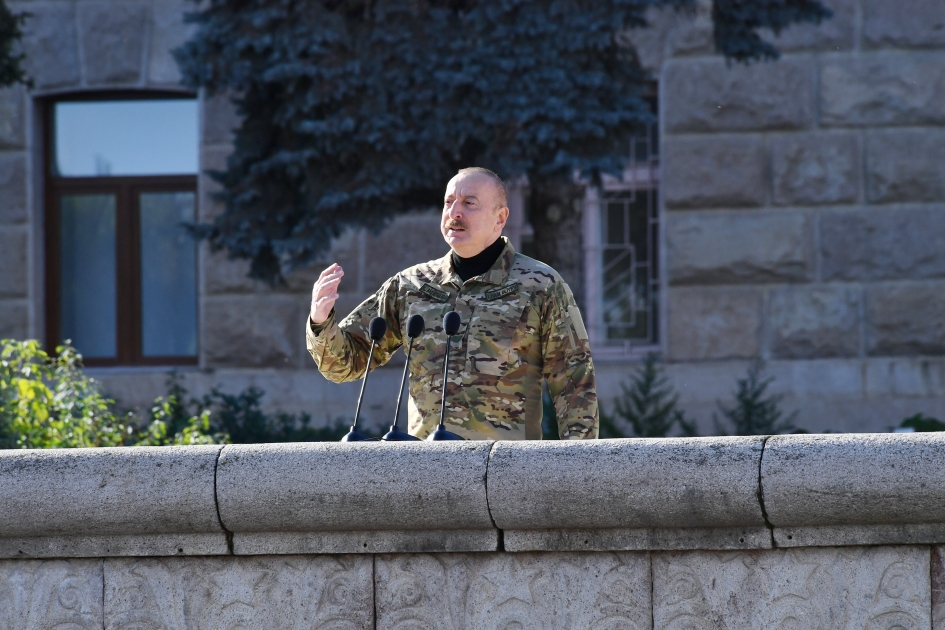Ilham Aliyev: "People and cargo from Azerbaijan to Azerbaijan should pass without inspection"
Aliyev’s interview to local TV channels
“Cargoes, citizens and vehicles traveling from Azerbaijan to Azerbaijan should pass freely without being subjected to any inspections and without being involved in customs administration,” Azerbaijani President Ilham Aliyev said in an interview with local TV when asked about the opening of regional transport.
- Armenia-Russia Trade: Benefits and Risks of Sanctions
- “BRICS expansion: new opportunities for Azerbaijan”. Opinion from Baku
- Georgian Dream plans to toughen penalties for desecration of shrines
“International law doesn’t work in the world.”
“Over the past 10-15 years, I have repeatedly noted in my speeches that international law does not work in the world. These mechanisms are used only for weak countries. Major powers ignore international law. It is as if the laws are not written for them.
In that case, the countries that demand justice, which rightfully demand it, must themselves ensure that justice. Guided by this very principle, we have actively worked in recent years and restored justice ourselves.
“Unfortunately, the main players of the international community did not share this opinion of ours. On the contrary, they tried to accuse us, tried to use various pressure mechanisms against us.”

“The corridor does not compromise the sovereignty of any country”
Answering a journalist’s question about the prospect of opening regional transport, and in particular the Armenian project “Crossroads of the World”, Aliyev noted that without Azerbaijan’s consent the realization of such projects is impossible:
“It is impossible. I think this is just PR. As you know, Armenia does not fulfill one provision of the trilateral statement of November 10 and actually neglects its obligations. That is why they put forward such a proposal to cover this fact up and at the same time to erase the words “Zangezur corridor”.
The expression “Zangezour corridor” irritates them very much. And when I say that the corridor does not question the sovereignty of any country, there is a North-South corridor that passes through the territory of Azerbaijan. It does not mean that our sovereignty is questioned in this case. Finally, there is the East-West corridor, but for some reason in Armenia the word “corridor” evokes a slightly different attitude. That’s why it was first called the “Armenian crossroads” and then the “crossroads of peace”. But in reality, this is nothing more than a PR campaign.
First of all, they must give us unimpeded passage between Zangilan and Ordubad. This is their obligation. I have already said and I would like to say again that cargo, citizens and vehicles traveling from Azerbaijan to Azerbaijan should pass freely without being subjected to any inspections or customs administration. As for the cargo from other countries, for example from Central Asia to Turkey through the territory of Armenia or even some from Azerbaijan to Turkey, of course, all customs duties should be paid. So this is a very fair position.”
The Azerbaijani President reminded that the route proposed by Armenia is inexpedient due to the unsuitability of this road at certain times of the year, and the corridor linking the main part of the country with Nakhichevan should pass through Meghri:
“People and goods from Azerbaijan to Azerbaijan must pass through without any inspection. Otherwise, Armenia will forever remain a dead end. If the route I mentioned is not opened, we do not intend to open the border with Armenia in any other place. So, in this way, they will get more harm than good from it.”
“You don’t have to reinvent the wheel.”
In Aliyev’s opinion, the peace treaty between Azerbaijan and Armenia “should consist not of 5-10 volumes, but at most of 5-10 pages, of basic principles. Here, as they say, there is no need to reinvent the wheel, it is just necessary to include the principles of international law.”
“After the September events [meaning the counter-terrorist operation in Karabakh on September 19-20 – JAMnews] we faced a new situation. The promises given to Armenia, in particular that both in the UN and in the European Union sanctions will be applied against Azerbaijan, that Azerbaijan will be under great pressure, that this operation will “cost” Azerbaijan dearly, this operation, all these communications have created a belief in Armenia that they can draw up a peace agreement the way they want and someone under pressure can make us agree.
That is why Armenia did not respond to our proposals for 70 days – the exchange of proposals here took place 5-6 times, texts with comments were sent. After we officially stated that we had been waiting for 70 days, that is, at that time it seemed to be 60 days, they submitted a proposal, and now there is not a single word in their proposal related to Karabakh and Karabakh Armenians. This topic has already been excluded, and the real conditions for signing a peace agreement have actually appeared now, exactly after the September operation.
I should also say that, unlike them, we sent our comments after 30, not 70 days, and then two weeks later they sent new comments on the 4th of this month. So again the question arises: if it was possible to submit these comments within two weeks, what did you wait for 70 days last time? So my version is completely confirmed.”
The Azerbaijani president also added that his country does not need guarantors of the peace treaty:
“Armenia wants this peace treaty to have guarantors. We believe that there is no need for that. It will be a peace treaty signed by two sovereign states. We don’t need any guarantors there, and if it is going to be signed bilaterally, it should be signed. If someone wants to help, we have no objection to that either. However, this assistance should not be forced.
Today some people are competing to negotiate in this country, another country, or a third country. In a way, this resembles geopolitical rivalry. I would not like that. I would not like the Armenian-Azerbaijani relations to turn into a geopolitical issue at all. This is an issue between our two countries, we should solve it ourselves. If we come to an agreement, a peace treaty will be signed. If we don’t, then the negotiations will either continue or stop. Both options are possible.”




















